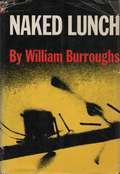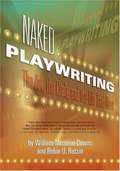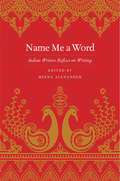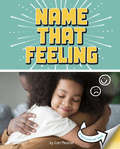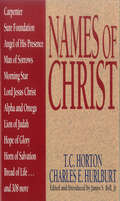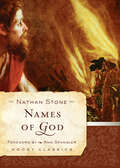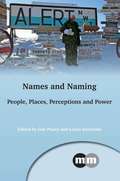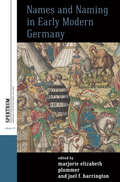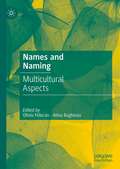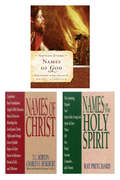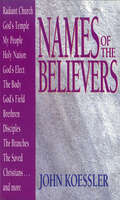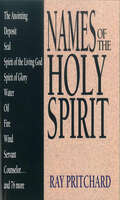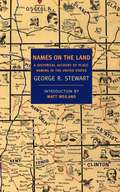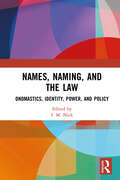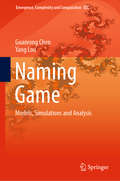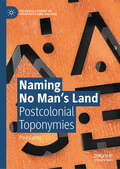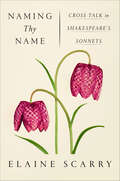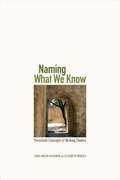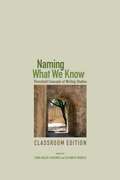- Table View
- List View
Naked Lunch
by William S. BurroughsDelirious, nonlinear ravings of a junkie in hell. Also includes excerpts from the Boston trial where it was declared not obscene in 1966.
Naked Playwriting: The Art, the Craft, and the Life Laid Bare
by William Missouri Downs Robin U. RussinOffers a playwriting course, from developing a theme through plotting and structuring a play, developing characters, creating dialog, formatting the script, and applying methods that aid the actual writing and rewriting processes. This book also provides guidance on marketing and submitting play scripts for both contests and production.
Name Me a Word: Indian Writers Reflect on Writing
by Meena AlexanderA wide-ranging anthology of twentieth-century and contemporary writing from India and the Indian diaspora, curated by a distinguished scholar and poet Internationally renowned scholar, poet, and essayist Meena Alexander brings together leading twentieth- and twenty-first-century voices from India and the diaspora in this anthology. Contributors include English-language luminaries such as R. K. Narayan, Salman Rushdie, and Arundhati Roy and powerful writers in Indian languages such as U. R. Ananthamurthy, Mahasweta Devi, and Lalithambika Antherjanam. This book will make a thoughtful gift for poetry and fiction enthusiasts and fans of Indian literature, as well as an ideal volume for academics introducing writers from the subcontinent.
Name that Feeling: A Turn-and-See Book (What's Next?)
by Cari MeisterLightning flashes. Thunder rumbles. It’s a big storm! How do you think Micah feels? Woof! Woof! Gemma’s grandma brought her a puppy. How do you think Gemma feels? Turn the page to find out which feeling matches the description. Would you feel the same way?
Names Of Christ (Names of... Series)
by Charles E. Hurlburt T. C. HortonLily of the Valley. Bright and Morning Star. Rose of Sharon. Author of the Faith. The Lord Jehovah. Friend of Sinners. Son of Man. King of Kings.What does Christ mean to you? When you consider His person, His work, and His words, are you struck by the depth and complexity, the richness and incalculable beauty of who He is? This classic study, revised for today's reader, examines the many names of Christ, more than 300 in all, each revealing an intimate portrait of the Savior. In this new edition, devotional prayers accompany each name, helping you meditate on the character and person of Jesus Christ. This book is an invaluable resource to any library and is sure to enrich your personal devotional time. Names of Christ follows Names of God in a classic trilogy designed to help contemporary Christians better understand the glory, majesty, and power of the triune God.
Names Of Christ (Names of... Series)
by Charles E. Hurlburt T. C. HortonLily of the Valley. Bright and Morning Star. Rose of Sharon. Author of the Faith. The Lord Jehovah. Friend of Sinners. Son of Man. King of Kings.What does Christ mean to you? When you consider His person, His work, and His words, are you struck by the depth and complexity, the richness and incalculable beauty of who He is? This classic study, revised for today's reader, examines the many names of Christ, more than 300 in all, each revealing an intimate portrait of the Savior. In this new edition, devotional prayers accompany each name, helping you meditate on the character and person of Jesus Christ. This book is an invaluable resource to any library and is sure to enrich your personal devotional time. Names of Christ follows Names of God in a classic trilogy designed to help contemporary Christians better understand the glory, majesty, and power of the triune God.
Names Of God (Names of... Series)
by Nathan StoneJehovah-tsidkenu, "the Lord our righeousness"; Jehovah-shalom, "the Lord our peace"; Jehovah-jireh, "the Lord will provide."This is a study of the twelve most common Hebrew names for God-and their significance and fulfillment in Christ. God's names reveal not only different dimensions of His character but also point to their fulfillment in the Person and work of Jesus Christ. This classic study examines the Old Testament names of God and the particular aspect of His character and dealings with man that each reveals. Names of God is a book that will help contemporary Christians better understand the glory, majesty, and power of God. (More than 115,000 in print)
Names Of God (Names of... Series)
by Nathan StoneJehovah-tsidkenu, "the Lord our righeousness"; Jehovah-shalom, "the Lord our peace"; Jehovah-jireh, "the Lord will provide."This is a study of the twelve most common Hebrew names for God-and their significance and fulfillment in Christ. God's names reveal not only different dimensions of His character but also point to their fulfillment in the Person and work of Jesus Christ. This classic study examines the Old Testament names of God and the particular aspect of His character and dealings with man that each reveals. Names of God is a book that will help contemporary Christians better understand the glory, majesty, and power of God. (More than 115,000 in print)
Names and Naming
by Guy Puzey Laura KostanskiThis book explores international trends in naming and contributes to the growing field of onomastic enquiry. Naming practices are viewed here through a critical lens, demonstrating a high level of political and social engagement in relation to how we name people and places. The contributors to this publication examine why names are not only symbols of a person or place, but also manifestations of cultural, linguistic and social heritage in their own right. Presenting analyses of geographically and culturally diverse perspectives and case studies, the book investigates how names can represent deeper kinds of identity, act as objects of attachment and dependence, and reflect community mores and social customs while functioning as powerful mechanisms of inclusion and exclusion. The book will be of interest to researchers in onomastics, sociology, human geography, linguistics and history.
Names and Naming in Early Modern Germany (Spektrum: Publications of the German Studies Association #20)
by Joel F. Harrington Marjorie Elizabeth PlummerThroughout the many political and social upheavals of the early modern era, names were words to conjure by, articulating significant historical trends and helping individuals and societies make sense of often dramatic periods of change. Centered on onomastics—the study of names—in the German-speaking lands, this volume, gathering leading scholars across multiple disciplines, explores the dynamics and impact of naming (and renaming) processes in a variety of contexts—social, artistic, literary, theological, and scientific—in order to enhance our understanding of individual and collective experiences.
Names and Naming: Multicultural Aspects
by Oliviu Felecan Alina BugheșiuThis edited book examines names and naming policies, trends and practices in a variety of multicultural contexts across America, Europe, Africa and Asia. In the first part of the book, the authors take theoretical and practical approaches to the study of names and naming in these settings, exploring legal, societal, political and other factors. In the second part of the book, the authors explore ways in which names mirror and contribute to the construction of identity in areas defined by multiculturalism. The book takes an interdisciplinary approach to onomastics, and it will be of interest to scholars working across a number of fields, including linguistics, sociology, anthropology, politics, geography, history, religion and cultural studies.
Names of God/Names of Christ/Names of the Holy Spirit Set
by Nathan Stone T.C. Horton Charles E. Hurlburt Ray PritchardThis complete, three-volume set includes Names of God, Names of Christ, and Names of Holy Spirit.In Names of God, Nathan J. Stone writes, &“Indeed we cannot say all that the mysterious word God means to us until we know more about Him.&” God&’s many names reveal not only different dimensions of His character but also point to their fulfillment in the Person and work of Jesus Christ. This insightful little book accurately and clearly works through the many names of God throughout the Old Testament. We can now see God in new lights and angles as we learn of His justice, His unbounded love, His preeminence, and His character--all through His names. In Names of Christ, more than 300 names of Christ are examined in all, each revealing an intimate portrait of the Savior. In this new edition, devotional prayers accompany each name, helping you meditate on the character and person of Jesus Christ. This book is an invaluable resource to any library and is sure to enrich your personal devotional time. In Names of the Holy Spirit, the author examines the Holy Spirit's ministry throughout Scripture as revealed in the names the Bible gives Him. Knowledge of Him will help you understand:His power His indwelling His anointing His intercession His gifts Fruit produced in believers
Names of God/Names of Christ/Names of the Holy Spirit Set
by Nathan Stone T.C. Horton Charles E. Hurlburt Ray PritchardThis complete, three-volume set includes Names of God, Names of Christ, and Names of Holy Spirit.In Names of God, Nathan J. Stone writes, &“Indeed we cannot say all that the mysterious word God means to us until we know more about Him.&” God&’s many names reveal not only different dimensions of His character but also point to their fulfillment in the Person and work of Jesus Christ. This insightful little book accurately and clearly works through the many names of God throughout the Old Testament. We can now see God in new lights and angles as we learn of His justice, His unbounded love, His preeminence, and His character--all through His names. In Names of Christ, more than 300 names of Christ are examined in all, each revealing an intimate portrait of the Savior. In this new edition, devotional prayers accompany each name, helping you meditate on the character and person of Jesus Christ. This book is an invaluable resource to any library and is sure to enrich your personal devotional time. In Names of the Holy Spirit, the author examines the Holy Spirit's ministry throughout Scripture as revealed in the names the Bible gives Him. Knowledge of Him will help you understand:His power His indwelling His anointing His intercession His gifts Fruit produced in believers
Names of the Believers (Names of... Series)
by John KoesslerWhat's in a name?In our culture, parents often select names for their children that are popular or have a nice ring to them. But our heavenly Father bestows on His children names that carry far more meaning and significance. In fact, the Bible reveals many labels believers have that indicate calling, position, and giftedness in Christ.In this devotional study, Dr. John Koessler shows that the names Christ gives to His followers contain more importance and richness than we often realize. Written in a fresh and compelling style, Names of the Believers will encourage and inspire Christians to live up to the names God Himself has given them.Names of the Believers follows the Names of God, Names of Christ, and Names of the Holy Spirit trilogy designed to help Christians better understand the glory, majesty, and power of the triune God.
Names of the Believers (Names of... Series)
by John KoesslerWhat's in a name?In our culture, parents often select names for their children that are popular or have a nice ring to them. But our heavenly Father bestows on His children names that carry far more meaning and significance. In fact, the Bible reveals many labels believers have that indicate calling, position, and giftedness in Christ.In this devotional study, Dr. John Koessler shows that the names Christ gives to His followers contain more importance and richness than we often realize. Written in a fresh and compelling style, Names of the Believers will encourage and inspire Christians to live up to the names God Himself has given them.Names of the Believers follows the Names of God, Names of Christ, and Names of the Holy Spirit trilogy designed to help Christians better understand the glory, majesty, and power of the triune God.
Names of the Holy Spirit (Names of... Series)
by Ray PritchardSpirit of Truth. Dove. Spirit of Holiness. Eyes of the LordHow much do you know about the person and works of the Holy Spirit? To many Christians, the third member of the Trinity is a mystery.This devotional study of the Holy Spirit looks at His ministry throughout Scripture as revealed in the names the Bible gives Him. Knowledge of Him will help you understand:-His power -His intercession-His indwelling -His gifts-His anointing -Fruit produced in believersNames of the Holy Spirit follows Names of Christ in a trilogy designed to help Christians better understand the glory, majesty, and power of the triune God.
Names of the Holy Spirit (Names of... Series)
by Ray PritchardSpirit of Truth. Dove. Spirit of Holiness. Eyes of the LordHow much do you know about the person and works of the Holy Spirit? To many Christians, the third member of the Trinity is a mystery.This devotional study of the Holy Spirit looks at His ministry throughout Scripture as revealed in the names the Bible gives Him. Knowledge of Him will help you understand:-His power -His intercession-His indwelling -His gifts-His anointing -Fruit produced in believersNames of the Holy Spirit follows Names of Christ in a trilogy designed to help Christians better understand the glory, majesty, and power of the triune God.
Names on the Land: A Historical Account of Place-Naming in the United States
by George R. StewartGeorge R. Stewart's classic study of place-naming in the United States was written during World War II as a tribute to the varied heritage of the nation's peoples. More than half a century later, Names on the Land remains the authoritative source on its subject, while Stewart's intimate knowledge of America and love of anecdote make his book a unique and delightful window on American history and social life. Names on the Land is a fascinating and fantastically detailed panorama of language in action. Stewart opens with the first European names in what would later be the United States-- Ponce de León's flowery Florída, Cortés's semi-mythical isle of California, and the red Rio Colorado-- before going on to explore New England, New Amsterdam, and New Sweden, the French and the Russian legacies, and the unlikely contributions of everybody from border ruffians to Boston Brahmins. These lively pages examine where and why Indian names were likely to be retained; nineteenth-century fads that gave rise to dozens of Troys and Athens and to suburban Parksides, Brookmonts, and Woodcrest Manors; and deep and enduring mysteries such as why "Arkansas" is Arkansaw, except of course when it isn't. Names on the Land will engage anyone who has ever wondered at the curious names scattered across the American map. Stewart's answer is always a story-- one of the countless stories that lie behind the rich and strange diversity of the USA.
Names, Naming, and the Law: Onomastics, Identity, Power, and Policy
by I. M. NickAcross many social and commercial domains, governments regulate the official names used to identify individuals, groups, places, companies & products, and even diseases. This innovative volume investigates the relationship between names and the law, with its significant implications for identity (individual, familial, race, ethnicity, gender, species, brand & product industry, etc.) and status (social, scientific, economic, and political). I. M. Nick introduces the state of the art on this interdisciplinary topic¾ providing a diachronic and synchronic view of onomastics and the law¾ and expert contributors examine seminal Anglo-American legal cases to demonstrate how name polices relate to broader questions of power, privilege, and politics. Each chapter offers an overview of key issues in onomastics and language policy across multiple geo-cultural contexts, and applies the interdisciplinary insights to real-world policies. This book is a valuable resource for scholars of legal linguistics, forensic linguistics, onomastics, language policy, and cultural studies.
Names, Proverbs, Riddles, and Material Text in Robert Frost
by Timothy D. O’brienThis study examines several unexplored aspects of the poetry of Robert Frost, one of the most widely read and studied American poets, and shows how they contribute to the reader's experience and modernism in general.
Naming Game: Models, Simulations and Analysis (Emergence, Complexity and Computation #34)
by Guanrong Chen Yang LouThis book provides a gradual introduction to the naming game, starting from the minimal naming game, where the agents have infinite memories (Chapter 2), before moving on to various new and advanced settings: the naming game with agents possessing finite-sized memories (Chapter 3); the naming game with group discussions (Chapter 4); the naming game with learning errors in communications (Chapter 5) ; the naming game on multi-community networks (Chapter 6) ; the naming game with multiple words or sentences (Chapter 7) ; and the naming game with multiple languages (Chapter 8). Presenting the authors’ own research findings and developments, the book provides a solid foundation for future advances. This self-study resource is intended for researchers, practitioners, graduate and undergraduate students in the fields of computer science, network science, linguistics, data engineering, statistical physics, social science and applied mathematics.
Naming No Man’s Land: Postcolonial Toponymies (Palgrave Studies in Creativity and Culture)
by Paul CarterThis book is a practice-based exploration of the politics and poetics of replacing colonial placenames with Indigenous ones. From a horizon of case-studies in Western Australia, the study develops a lively dialogue with international critical toponymy theory and with older etymological approaches to place renaming and legitimation. The author shows how renaming raises fundamental questions of meaning, reference and cross-cultural equivalence. Recognising the ‘sense of place’ values that accrue to placenames, Carter argues that placenames have a creative as well as discursive function: they are talking points that bring places into being. For this reason, to decolonize toponymy involves a postcolonial poetics. Naming No Man’s Land argues for a practical, community-shaped toponymic poetics that escapes from the binarist logic of imposition/erasure, showing that, when the principle that ‘places are made after their stories’ is followed, new creative mechanisms of co-existence can emerge. A must read for anyone engaged in postcolonial studies, creativity studies, cultural geography, sociolinguistics, historical ethnography, eco-criticism, environmental humanities, (Australian) Aboriginal studies, and related disciplines.
Naming Thy Name: Cross Talk in Shakespeare's Sonnets
by Elaine ScarryA fascinating case for the identity of Shakespeare’s beautiful young manSHAKESPEARE’S SONNETS ARE indisputably the most enigmatic and enduring love poems written in English. They also may be the most often argued-over sequence of love poems in any language. But what is it that continues to elude us? While it is in part the spellbinding incantations, the hide-and-seek of sound and meaning, it is also the mystery of the noble youth to whom Shakespeare makes a promise—the promise that the youth will survive in the breath and speech and minds of all those who read these sonnets. “How can such promises be fulfilled if no name is actually given?” Elaine Scarry asks. This book is the answer. Naming Thy Name lays bare William Shakespeare’s devotion to a beloved whom he not only names but names repeatedly in the microtexture of the sonnets, in their architecture, and in their deep fabric, immortalizing a love affair. By naming his name, Scarry enables us to hear clearly, for the very first time, a lover’s call and the beloved’s response. Here, over the course of many poems, are two poets in conversation, in love, speaking and listening, writing and writing back. In a true work of alchemy, Scarry, one of America’s most innovative and passionate thinkers, brilliantly synthesizes textual analysis, literary criticism, and historiography in pursuit of the haunting call and recall of Shakespeare’s verse and that of his (now at last named) beloved friend.
Naming What We Know
by Linda Adler-KassnerNaming What We Know examines the core principles of knowledge in the discipline of writing studies using the lens of "threshold concepts"--concepts that are critical for epistemological participation in a discipline. The first part of the book defines and describes thirty-seven threshold concepts of the discipline in entries written by some of the field's most active researchers and teachers, all of whom participated in a collaborative wiki discussion guided by the editors. These entries are clear and accessible, written for an audience of writing scholars, students, and colleagues in other disciplines and policy makers outside the academy. Contributors describe the conceptual background of the field and the principles that run throughout practice, whether in research, teaching, assessment, or public work around writing. Chapters in the second part of the book describe the benefits and challenges of using threshold concepts in specific sites--first-year writing programs, WAC/WID programs, writing centers, writing majors--and for professional development to present this framework in action.Naming What We Know opens a dialogue about the concepts that writing scholars and teachers agree are critical and about why those concepts should and do matter to people outside the field.
Naming What We Know, Classroom Edition: Threshold Concepts of Writing Studies
by edited by Linda Adler-Kassner, Elizabeth WardleNaming What We Know, Classroom Edition examines the core principles of knowledge in the discipline of writing studies, using the lens of “threshold concepts”—concepts that are critical for epistemological participation in a discipline. This edition focuses on the working definitions of thirty-seven threshold concepts that run throughout the research, teaching, assessment, and public work in writing studies. Developed from the highly regarded original edition in response to grassroots demand from teachers in writing programs around the United States and written by some of the field’s most active researchers and teachers, the classroom edition is clear and accessible for an audience of even first-year writing students.
